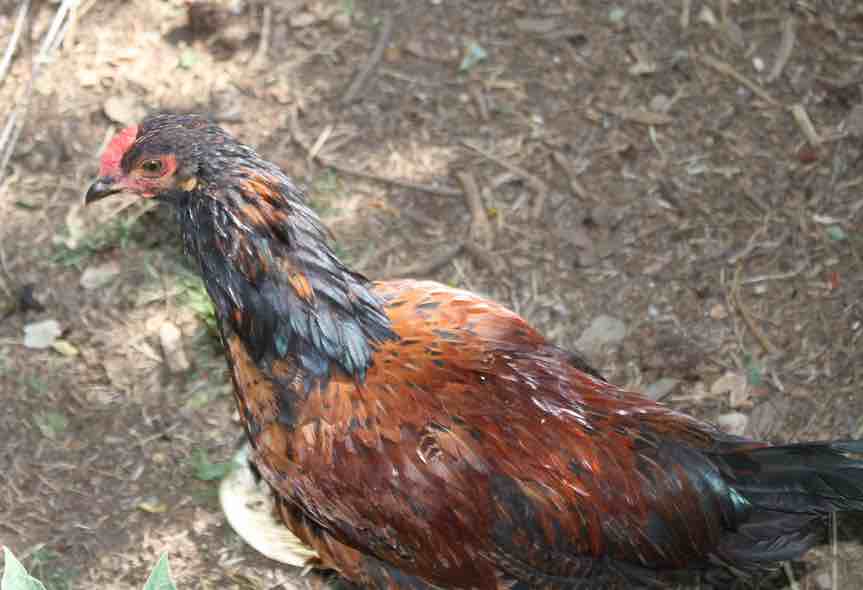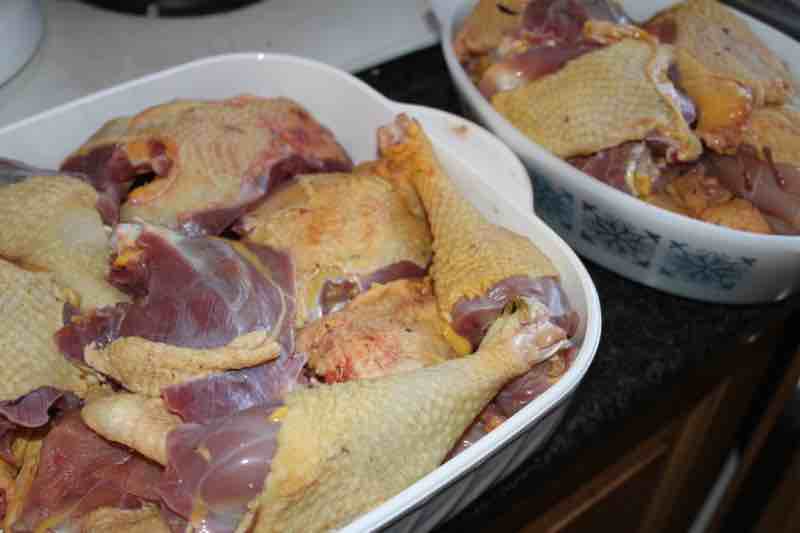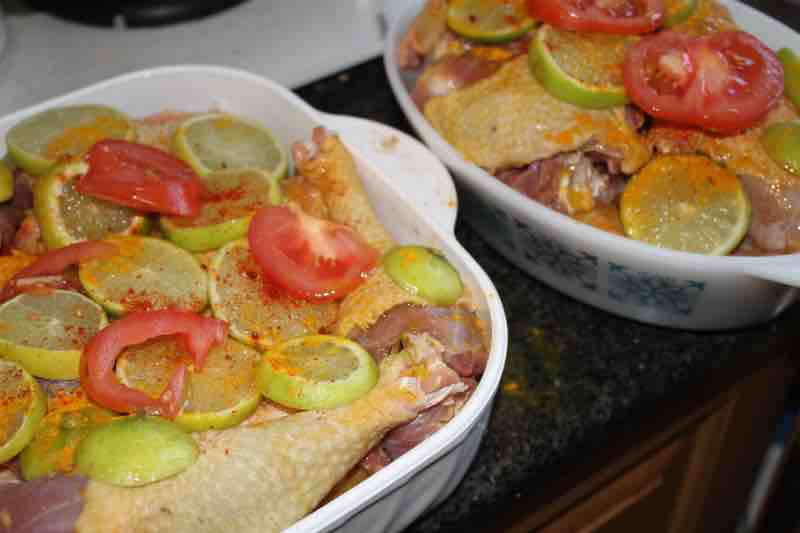- Bernard Preston homepage
- Chickens
- Chilli Chicken Recipe
Chilli chicken recipe: using your own free-range cockerels
This chilli chicken recipe using your own free-range cockerels is for a tiny minority of people; but you could purchase them from the supermarket.
For those with hens in the garden and a cockerel because you want proper eggs, free-range and fertile, the future of your young roosters has to be considered first.
Half of those adorable fluffy chicks will grow up within a few months to be rowdy and randy little beasts that will torment the hens mercilessly and draw a vitriolic rage from the neighbours just over the fence.
This page was updated by Bernard Preston on 16th March, 2020.

- nut.
- Chop and add an onion.
- Add some bay leaves and any other spices like peppadews and coriander-seeds that you particularly love.
- Chop up the chicken into relatively small pieces with a heavy knife and add it to the hot onion-mix; turn until well coated.
- Add half a cup of water and simmer for perhaps fifteen-minutes.
- Preheat your oven to 180*C.
- Place the chicken pieces into an oven-dish. Pour the mixed juices over the bird, replace the lid and put it in to bake.
- After thirty-minutes, lower the temperature to 150* and allow your chilli chicken recipe to cook slowly for a few hours until tender.
The chorus at 4am, long before dawn, will invite outrageous comment from your neighbours and friends; and your own family too.
This chicken comes from Zulu ancestry. It is far more of a game-bird than a domesticated hen; the meat is quite brown and unlike what you are accustomed to. So will the beautiful flavour be. We call them our pheasants.
- Bernard Preston homepage
- Chickens
- Chilli Chicken Recipe
The cockerels will be slightly larger than the pullets initially and then it will become more obvious as their combs grow.
At around three months you will start to notice a very strange sound emanating from the garden, akin to a soprano whose voice has started to break.
By four-months, they must go and frankly you will have difficulty finding someone who will take them.
Either you forego your love of proper-eggs and not keep a cockerel, or you learn to do what the farming community take for granted; slaughtering your own birds.
In theory it is possible to take all the eggs from your hens as soon as they lay them, but in practice it is not straight-forward to stop them from becoming broody.
Actually the Leghorns do not become broody that readily.
Chilli chicken recipe
Your chilli chicken recipe first needs to be marinaded overnight otherwise it will be tough; the flavour of your own birds is without equal.
Elsewhere perhaps one day I will talk about the actual act of slaughtering your cockerels; for the moment, just accept that like all new things, the first time will be very difficult, but thereafter it becomes easier to cut a throat. You do not use an axe and there will be no headless birds flying around the garden, squirting blood.
Do you think that is perfectly ghastly? Perhaps we should all become vegetarians; that is where my roots are and it would not be that difficult to return. We are avid lovers of legumes for much of our protein.
Having said that, I am a committed omnivore; we eat and enjoy both meat and vegetables, and fruit too. But the commercial chickens from the butcher are tasteless and boring, and raised in horrific circumstances.
Our free-range birds lead a sublime life until the day I arrive with a determined glint in my eye; off with their heads.
To date I am totally sexist and only the young cockerels get the chop. We love real free-range eggs too; do you have doubts about what you read on the label? You should have.
Our free-range eggs are to die for.
Newsletter
Our newsletter is entitled "create a cyan zone" at your home, preserving both yourself and Mother Earth for future generations; and the family too, of course. We promise not to spam you with daily emails promoting various products. You may get an occasional nudge to buy one of my books.
Here are the back issues.
- Lifestyle and ideal body weight
- What are ultra-processed foods?
- Investing in long-term health
- Diseases from plastic exposure
- Intensive lifestyle management for obesity has limited value
- A world largely devoid of Parkinson's Disease
- The impact of friendly bacteria in the tum on the prevention of cancer
- There's a hole in the bucket
- Everyone is talking about weight loss drugs
- Pull the sweet tooth
- If you suffer from heartburn plant a susu
- Refined maize meal and stunting
- Should agriculture and industry get priority for water and electricity?
- Nature is calling
- Mill your own flour
- Bake your own sourdough bread
- Microplastics from our water
- Alternative types of water storage
- Wear your clothes out
- Comfort foods
- Create a bee-friendly environment
- Go to bed slightly hungry
- Keep bees
- Blue zone folk are religious
- Reduce plastic waste
- Family is important
- What can go in compost?
- Grow broad beans for longevity
- Harvest and store sunshine
- Blue zone exercise
- Harvest and store your rainwater
- Create a cyan zone at your home

You have done the deed, plunged their bodies into boiling water, taken twenty minutes to pluck the feathers and cleaned out the guts; your young cockerel is ready for this chilli chicken recipe.
- Squeeze a fresh lemon and pour it, pulp and all, over your bird; scoop out any pips you see.
- Sprinkle two teaspoons of curry powder over the chicken; and any other spices you enjoy. We use mixed herbs and freshly-roasted cumin seeds.
- Slice a tomato and drape them over the bird; I like to add slithers of peppadew chilli but you use your favourite.
Place the chicken in the fridge overnight, spooning the liquid over the bird a few times.

Chilli chicken recipe
This is probably something quite alien to you; it was to me until a few months ago. But slaughtering cockerels for a chilli chicken recipe has been happening since the dawn of time. This way, you have control over the food your birds feed on; the culling is quick and clean, and far more humane than in any abattoir.
I will be adding more photos as and when they are available.
Useful links
Did you find this page interesting? How about forwarding it to a friendly book or food junkie? Better still, a social media tick would help.
- Bernard Preston homepage
- Chickens
- Chilli Chicken Recipe
Address:
56 Groenekloof Rd,
Hilton, KZN
South Africa
Website:
https://www.bernard-preston.com